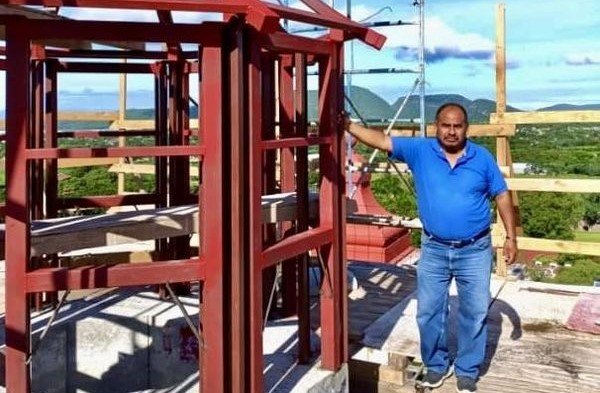June 1970. Saint Josemaria Escriva is in Mexico. In the State of Morelos, in what used to be the hacienda of Montefalco, a gathering has been organized for women who take part in formative activities there. The founder of Opus Dei has brought candy for the young children.
Lupe is one of the women there, with a smile on her face and eight months pregnant. At the end of the family gathering, Saint Josemaria comes over and blesses her and the child who will soon be born. The founder says good-bye to all the women and they return home, talking about what they have just heard. “Did you know that…? I liked that… I have to tell my midwife about that…”
More than fifty years have gone by since that hot afternoon in June. Jacinto Barranco is recounting this story that he so often heard from the lips of his mother and his aunt. “To have received the founder of Opus Dei’s blessing when I was still in my mother’s womb fills me with joy,” he says.
Today Jacinto works as the maintenance man in the reconstructed hacienda and has discovered his vocation to Opus Dei as a supernumerary. “When I realized that I could focus all my work on God, I saw that this was the meaning of my life: to stay close to God in and with my professional work.”
Just as a chemical engineer can find God’s wisdom in atoms and molecules, and the physician in the miracle of life, Jacinto’s encounter with God takes place in his maintenance work in Montefalco. “I find great joy in sanctifying my work, without looking for human recognition. I try to do it as well as possible and with joy.”
“A vocation, a call from God,” Saint Josemaria wrote, “is a grace from the Lord, a choice made by divine goodness, a reason for holy pride, a call to serve all men and women joyfully out of love for Christ” (The Forge, 17). One can discover the greatness of the universal call to holiness in the most ordinary settings of daily life. At work and at home. When resting and with one’s friends. With one’s mother-in-law and with the children. “I like to talk as much as possible with my children. I think the most important thing I’ve learned as a father is that the best thing you can do for your children is to listen to them and give them good example.”

Jacinto knows Montefalco like the palm of his hand. “From my first memories, I have always been coming here.” Catechism classes. Mango trees and soccer games with the other boys from the town. Fifty years of memories. A vocation discovered in the ordinary activities of each day.
When Saint Josemaria went to Montefalco he said: “Montefalco is a madness of God’s love! I usually say that the pedagogy of Opus Dei can be summed up in two phrases: work with common sense and work with supernatural sense. In this place Fr. Pedro [Casciaro] and my Mexican daughters and sons have worked only with supernatural sense. Taking over joyfully a pile of ruins is humanly absurd. But you have been concerned about souls and made a marvel of love come true. May God bless you!”

The Montefalco conference center is indeed a madness written with divine letters, with verses of faith and rhymes of hope. And it is this divine madness that makes possible a true change in the world, made up of great care for little things, doing one’s work out of love for God and all men and women. As Jacinto knows so well from his daily work: “Great souls pay much attention to little things” (The Way, 818).
